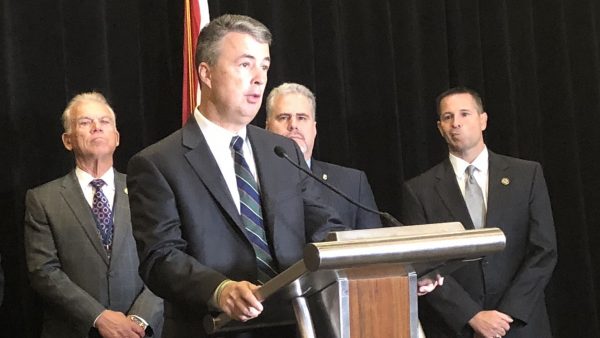Considering Faith: Religion in the Workplace
Amy Gartman was looking for someone to reupholster her couch cushions. She visited a Birmingham local fabric shop and asked them if they knew someone who could help her. They gave her Dover Ramsey’s business card. She knew right then, he was the person she wanted to do business with.
Ramsey has a bible verse on his business cards for owns Dove’s Upholstery Tech in the Huffman area of eastern Birmingham. There is a Bible verse on his business card. Gartman says, given the choice, she would rather do business with someone who promotes himself or herself as a Christian.
“Over the years, I have found that when you’re dealing with Christian organizations or businesses, there’s a greater level of courtesy, there a greater level of kindness. I find there’s greater accommodation for what my needs are. Because, I feel like it’s almost like in the kingdom of God, you are doing business with the family. So, I feel comfortable and a greater level of trust.”
As for Ramsey, he says even though reupholstery pays his bills, he enjoys helping helping people he thinks those, whom he feels need a prayer. If a customer visits his store, he takes care of business…
“But, before you leave we would talk and I would be talking about the goodness of God, and this is day the Lord has made, we’re going to rejoice and be glad of it.”
Like Ramsey, marketing and business experts say more companies are choosing to mixing business and religion. David Miller, director of the Princeton University Faith and Work Initiative, says in some cases it’s a matter of connecting with a niche market.
“I guess it’s no surprise then, that some companies are going to put some symbols of fishes on their businesses business card or some indication that they’re a Christian company or run by someone who’s a Christian. And, that certainly goes on. You figure out who you are and you present yourself to the public.”
But it can backfire. Take consumer Ryan Black. The Birmingham computer tech says he’s skeptical of companies touting their spirituality.
“You still can’t tell how they’re going to treat you. Just like you can’t tell a lot of folks who go to church every Sunday might not be the best people every other day of the week.”
“I wouldn’t be so cynical as to assume someone who attaches a religious statement or a Bible verse or a fish symbol to a business is doing so purely because they think it will sell more product or service.”
That’s Samford University ethics professor John Knapp.
“I think for many people, these kinds of expressions are simply a way of being true or authentic to their own faith. In the case of the Cathey family that owns Chick Fil A this is a matter of principle for them, in being true to the values of their faith, and one of the Biblical principles they’re very committed to is not being opened on Sunday.”
But Knapp warns it can be extremely cost the bottom line. costly. Take Hobby Lobby. They lost one million dollars the first year their doors were closed on Sunday. Then there are numbers that are harder to track – customers who decide not to patronize a business that promotes religion. Judith Neal is a national business culture consultant.
“If it’s a Christian drycleaners, I get a little more concerned because one of my core values is a welcoming of diversity, and being able to have interfaith conversations and create space where people from all traditions feel welcomed. And, so if I were a Muslim I don’t think I would want to go to a Christian drycleaner. I would not feel welcomed.”
Companies that mix business and religion can also face be exposing themselves to costly legal battles. The federal government reports complaints of religion-based discrimination in the workplace increased more 50% over the last decade. Most religion-based discrimination complaints were from employees who said they weren’t allowed to express their religious beliefs at work. But a new kind of lawsuit may be on the horizon as as companies increasingly promote themselves as “Christian” and hire employees who share their spiritual zeal.
“There are certainly companies that are starting to become so much in favor of the promotion of a particular religion, that they seem to ignore that fact that some of their own employees may not be of that faith.”
Reverend Barry Lynn is the Executive Director of Americans United For Separation of Church and State.
“Retreats for a particular religion, for example, are becoming more common. But, it also sends a message to a lot of people who are not of that faith, maybe you don’t belong here. I think in the future, we’re going to see people who say I was made to feel so lousy working here, because I’m not of the majority religion, that I was forced out of my job. And, that in the future, I think will lead to lawsuits around the country.”
Experts say companies should remember, one man’s witness can be another man’s harassment, and businesseses should strive to be “faith-friendly,” not faith based.
How food stamps could play a key role in fixing Jackson’s broken water system
JXN Water's affordability plan aims to raise much-needed revenue while offering discounts to customers in need, but it is currently tied up in court.
Alabama mine cited for federal safety violations since home explosion led to grandfather’s death, grandson’s injuries
Following a home explosion that killed one and critically injured another, residents want to know more about the mine under their community. So far, their questions have largely gone unanswered.
Crawfish prices are finally dropping, but farmers and fishers are still struggling
Last year’s devastating drought in Louisiana killed off large crops of crawfish, leading to a tough season for farmers, fishers and seafood lovers.
Lawmakers consider medical cannabis revamp
It’s been three years since Alabama lawmakers passed legislation establishing a system to govern medical cannabis in the state, yet not one prescription for the drug has been filled. The rollout has been delayed by lawsuits and conflict over the licensing process.
Man arrested in connection with device that exploded outside Alabama attorney general’s office
Kyle Benjamin Douglas Calvert, 26, of Irondale, Alabama, was arrested Wednesday on charges of malicious use of an explosive and possession of an unregistered destructive device, the U.S. attorney’s office said.
For some Gulf South schools, a March Madness loss can still be a win off the court
Making it into the NCAA Tournament can translate to boosts in student enrollment, athletic involvement, merchandise sales and more for participating schools.







